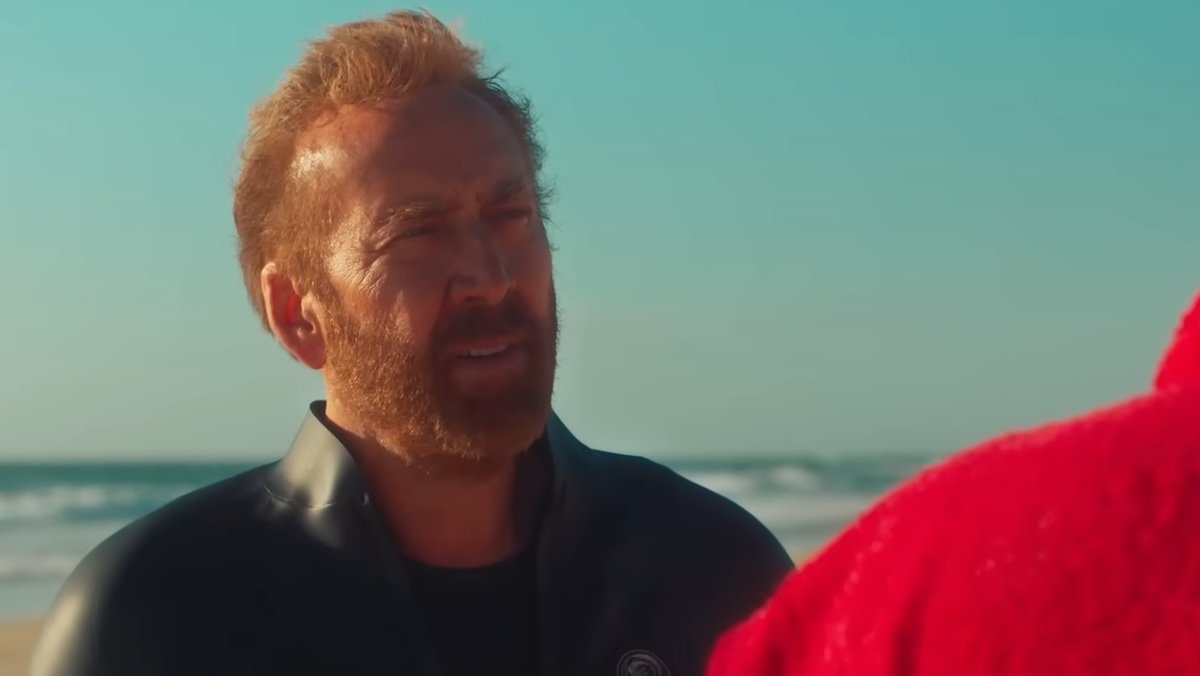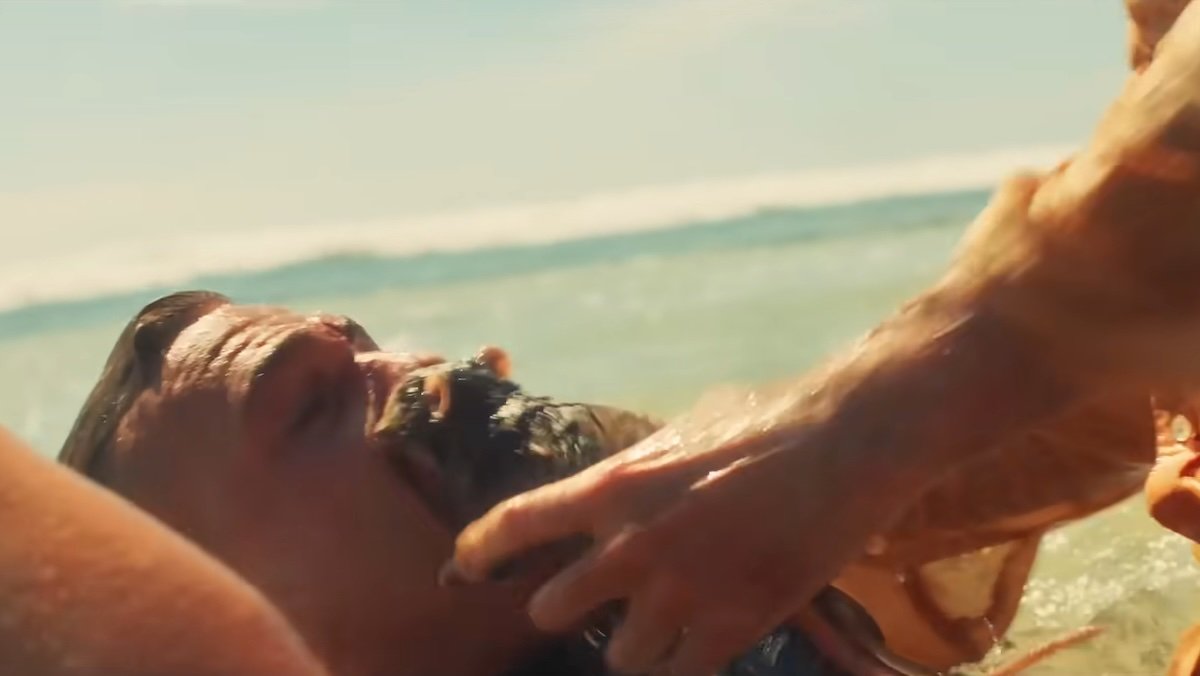In The Surfer, Nicolas Cage plays a man desperate to buy back his beautiful childhood home along the Australian coast. His dream quickly becomes a nightmare when a local gang of surfers acting with impunity turn a parking lot into Hell on Earth. Or do they? Or don’t they? The unsettling, upsetting, frequently funny film from director Lorcan Finnegan (Vivarium) offers no clear answers. But Nicolas Cage provided plenty when we got to talk to him about The Surfer. He told us what’s fun about about playing such a physically demanding role, how this movie is both similar and different to his past films, what makes The Surfer timely, and more.
(Note: This interview contains some minor spoilers, particularly one moment shown in the trailer.)
Nerdist: It seems pretty obvious you love what you do, that you love to make movies. It’s also obvious lots of people want to work with you. So of all the films you could have picked to star in, why this one? What is it that appealed to you about The Surfer?
Nicolas Cage: I related to the character. I felt bad for the character. His situation is something we can all, in this human experience, relate to. Where we think, “This house/that childhood memory/this place is going to make everything all right.” Or, “If I just work a little harder I’ll be able to get it all back.” That kind of Sturm und Drang and pathos spoke to me.
Also that it was unusual storytelling. When I read this script, I thought, “Well, this is different. This is weird. This is the kind of story I aspire to write.” It was a non-linear narrative. I couldn’t believe the whole thing took place on a beach in a parking lot. That was new. And the more I do this, the more I want to find expressions in cinema that are unlike other things that we kind of become bored with. I wanted to find a new way of storytelling.

I always think one of the best perks of being a famous actor is getting to work for months at beautiful locales. Yet somehow you signed up to shoot exclusively along a gorgeous beach where you spend most of your time suffering in the hot sun without shoes. What is it that you find fun about putting yourself through such a grueling production?
Cage: The circumstances were so extraordinary. What a situation, that I felt like it would give me some latitude, some range, to maybe play with voice and line delivery in a way that I could explore film performance on all cylinders. Just, “Go man go.”
And there were a couple moments that reminded me of old movies like Sabrina with the olive, when (Humprey) Bogart puts the olive in his uncle’s mouth and says, “Eat it.” I had just seen that moment. I was cracking up so much. And I thought, “Well, this character could be like a punk rock version of that moment and use the rat and shove it in (the character) Pitbull’s mouth and say, Eat it.” I was working with people that were open and were willing to try things.
And Lorcan has a marvelous sense of humor, and I couldn’t work with a nicer group of guys. Julian [McMahon] and Nick [Cassim], these are great actors. They’re also good people to be around. So working with both the cast and the crew built an environment where I felt free that I could explore and express myself.

It’s funny you mentioned what I think might be the biggest explosion from your character, the rat scene, because while I think you have genuine moments of madness in what is essentially a terrifying folk horror story, I actually found your performance understated in many ways. How did you decide when to hold back versus kind of letting yourself really go?
Cage: The situations told me, the scenes told me. The other actors told me. I wanted [my character] to start out as a relatively normal person. The only way the performance would work in my view is if we see this man disintegrate and become something else than what he began the movie as. It’s like peeling an onion. The layers start to reveal, “Oh, he went to work without his shoes on. Oh, his wife is getting remarried and has a child on the way. Now wait a minute, his car is gone, now his watch is gone, now his son is gone.” It’s this slow kind of degradation. If you pick at anyone long enough, any man or any woman long enough, you will eventually reach the inner caveman. To me this movie shows that.

The Surfer is described as a psychological thriller, and we see your character is unsure if he’s losing his mind as he struggles to separate reality from fantasy. You also get really dirty and suffer physically. You’ve started films where both of those things were also true. In what ways is The Surfer similar to some of your other movies that share the same kind of DNA and in what ways is it really different?
Cage: It’s similar in that in these other movies that you mentioned there’s a heartfelt emotional experience at the core of all of these characters I like to think people in the audience can relate to on some level. Or cringe, or feel, or have some sympathy for. Getting pathos with.
But it’s uniquely different because of the location and because of the situation. I’ve never been in a movie, I don’t recall, where the main character was up against tribalism and localism, and a kind of bro culture. Which is, let’s face it, everywhere right now. It’s something I think is on people’s minds. In that regard, this movie is actually rather timely, the frustration many people could be feeling. The attitude that is, “Our way or the highway,” and, “You will do as you’re told.” So I think this movie is different, and also the narrative is different. It’s not linear. It is enigmatic, it is psychedelic, it is surrealist.

It is similar to something like Wild at Heart, in that Lorcan is not afraid to be a surrealist. He’s not afraid to take his time with the storytelling. He is not afraid to weave other elements in with cinema, with cinematography or backstory, in a kind of hopscotch manner of flashback and foretelling. It was certainly his style and signature that makes this movie both horrifying and hilarious.
The Surfer leaves a lot of room for interpretation over what has actually taken place, especially at the end. Do you know definitively what happens and what it all means? Or do you only have the same info that viewers are left to grapple with?
Cage: That’s very interesting, and I hesitate to answer your question because I want to leave room for the audience to form their own secret relationship with the story and the characters in the movie.

Julian would say that this whole thing is in the Surfer’s mind, that none of it is real. That even his character is a figment of his imagination, which is fascinating. I rewatched the movie, again, looking at it from Julian’s perspective, and I thought it did work on that level in some ways.
But I’m not that aware while filming what ultimately the finished product will be and what you will receive from it. Nor do I really ultimately want to be. I want to keep it enigmatic enough that you can buy into your own story with it, or how it relates to you. What do you remember in your history or your past that you can understand why….maybe not as extreme…but why this guy feels the way he does.
The Surfer arrives in theaters on May 2, 2025.
Content shared from nerdist.com.


